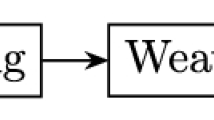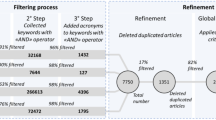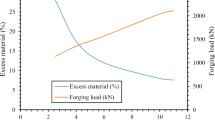Abstract
As one of the mainstream development directions of remanufacturing industry, remanufacturing system scheduling has become a hot research topic recently. This study regards a scheduling problem for remanufacturing systems where end-of-life (EOL) products are firstly disassembled into their constituent components, and next these components are reprocessed to like-new states. At last, the reprocessed components are reassembled into new remanufactured products. Among various system configurations, we investigate a scheduling problem for the one with parallel disassembly workstations, several parallel flow-shop-type reprocessing lines and parallel reassembly workstations for the objective of minimize total energy consumption. To address this problem, a mathematical model is established and an improved genetic algorithm (IMGA) is proposed to solve it due to the problem complexity. The proposed IMGA adopts a hybrid initialization method to improve the solution quality and diversity at the beginning. Crossover operation and mutation operation are specially designed subject to the characteristics of the optimization problem. Besides, an elite strategy is combined to gain a faster convergence speed. Numerical experiments are conducted and the results verify the effectiveness of the scheduling model and proposed algorithm. The work can assist production managers in better planning a scheduling scheme for remanufacturing systems.









Similar content being viewed by others
Data availability
The data used to support the findings of this study are available from the corresponding author upon request.
References
Aderiani AR, Warmefjod K, Soderberg R (2021) Evaluating different strategies to achieve the highest geometric quality in self-adjusting smart assembly lines. Robot Cim-Int Manuf 71:102164
Alam I, Barua S, Ishii K, Mizutani S, Hossain MM, Rahman IMM, Hasegawa H (2019) Assessment of health risks associated with potentially toxic element contamination of soil by end-of-life ship dismantling in Bangladesh. Environ Sci Pollut Res 26(23):24162–24175
Costa A, Cappadonna FA, Fichera S (2017) A hybrid genetic algorithm for minimizing makespan in a flow-shop sequence-dependent groupscheduling problem. J Intell Manuf 28(6):1269–1283
Daniel V, Guide R (1997) Scheduling with priority dispatching rules and drum-buffer-rope in a recoverable manufacturing system. Int J Prod Econ 53(1):101–116
Dou RL, Zhang YB, Nan GF (2019) Application of combined Kano model and interactive genetic algorithm for product customization. J Intell Manuf 30(7):2587–2602
Falih A, Shammari AZM (2020) Hybrid constrained permutation algorithm and genetic algorithm for process planning problem. J Intell Manuf 31(5):1079–1099
Fang K, Uhan N, Zhao F, Sutherland JW (2011) A new approach to scheduling in manufacturing for power consumption and carbon footprint reduction. J Manuf Syst 30(4):234–240
Fathollahi-Fard AM, Hajiaghaei-Keshteli M, Tavakkoli-Moghaddam R (2020a) Red deer algorithm (RDA): a new nature-inspired meta-heuristic. Soft Comput 24(19):14637–14665
Fathollahi-Fard AM, Hajiaghaei-Keshteli M, Tian GD, Li ZW (2020b) An adaptive Lagrangian relaxation-based algorithm for a coordinated water supply and wastewater collection network design problem. Inform Sci 512:1335–1359
Feng YX, Zhou MC, Tian GD, Li ZW, Zhang ZF, Zhang Q, Tan JR (2019) Target disassembly sequence and scheme evaluation for CNC machine tools using improved multiobjective ant colony algorithm and fuzzy integral. IEEE Trans Syst Man Cybern Syst 49(12):2438–2451
Fu YP, Wang HF, Tian GD, Li ZW, Hu HS (2019) Two-agent stochastic flow shop deteriorating scheduling via a hybrid multi-objective evolutionary algorithm. J Intell Manuf 30(5):2257–2272
Gao SC, Zhou MC, Wang YR, Cheng JJ, Yachi H, Wang JH (2019) Dendritic neuron model with effective learning algorithms for classification, approximation and prediction. IEEE Trans Neural Netw Lear 30(2):601–614
Giglio D, Paolucci M, Roshani A (2017) Integrated lot sizing and energy-efficient job shop scheduling problem in manufacturing/remanufacturing systems. J Clean Prod 148:624–641
Guide VDR (1995) A simulation-model of drum-buffer-rope for production planning and control at a Naval Aviation Depot. Simulation 35(3):157–168
Guide VDR (2000) Production planning and control for remanufacturing: industry practice and research needs. J Oper Manag 18(4):467–483
Guo XD, Zhang XL, Wang LF (2020) Fruit fly optimization algorithm based on single-gene mutation for high-dimensional unconstrained optimization problems. Mathematical Problems in Engineering 2020. https://doi.org/10.1155/2020/9676279
Heese HS, Cattani K, Ferrer G (2005) Competitive advantage through take-back of used products. Eur J Oper Res 164(1):143–157
Hojati M (2016) Minimizing make-span in 2-stage disassembly flow-shop scheduling problem. Comput Ind Eng 94:1–5
Holland JH (1992) Genetic algorithms. Sci Am 267(1):44–50
Ji B, Yuan XH, Yuan YB (2019) A hybrid intelligent approach for co-scheduling of cascaded locks with multiple chambers. IEEE Trans Cybern 49(4):1236–1248
Jiang H, Yi JJ, Chen SL, Zhu XM (2016) A multi-objective algorithm for task scheduling and resource allocation in cloud-based disassembly. J Manuf Syst 41:239–255
Jiang ZG, Ding ZY, Liu Y, Wang Y, Hu XL, Yang YH (2020) A data-driven based decomposition-integration method for remanufacturing cost prediction of end-of-life products. Robot Cim-Int Manuf 61:101838
Kalayci CB, Polat O, Gupta SM (2016) A hybrid genetic algorithm for sequence-dependent disassembly line balancing problem. Ann Oper Res 242(2):321–354
Kang Q, Song XY, Zhou MC, Li ZW (2019) A collaborative resource allocation strategy for decomposition-based multiobjective evolutionary algorithms. IEEE Trans Syst Man Cybern Syst 49(12):2416–2423
Kim HJ, Lee DH, Xirouchakis P, Kwin OK (2009) A branch and bound algorithm for disassembly scheduling with assembly product structure. J Oper Res Soc 60(3):419–430
Kim MG, Yu JM, Lee DH (2015) Scheduling algorithms for remanufacturing systems with parallel flow-shop-type reprocessing lines. Int J Prod Res 53(6):1819–1831
Kim JS, Park JH, Lee DH (2017a) Iterated greedy algorithms to minimize the total family flow time for job-shop scheduling with job families and sequence-dependent set-ups. Eng Optimiz 49(10):1719–1732
Kim JM, Zhou YD, Lee DH (2017b) Priority scheduling to minimize the total tardiness for remanufacturing systems with flow-shop-type reprocessing lines. Int J Adv Manuf Technol 91(9–12):3697–3708
King AM, Burgess SC, Ljomah W, McMahon CA (2006) Reducing waste: repair, recondition, remanufacture or recycle? Sustain Dev 14(4):257–267
Kizilkaya E, Gupta SM (1998) Material flow control and scheduling in a disassembly environment. Comput Ind Eng 35(1–2):93–96
Li XY, Gao L (2016) An effective hybrid genetic algorithm and tabu search for flexible job shop scheduling problem. Int J Prod Econ 174:93–110
Li DS, Zhang CY, Tian GD, Shao XY, Li ZW (2018a) Multiobjective program and hybrid imperialist competitive algorithm for the mixed-model two-sided assembly lines subject to multiple constraints. IEEE Trans Syst Man Cybern Syst 48(1):119–129
Li XY, Lu C, Gao L, Xiao SQ, Wen L (2018b) An effective multiobjective algorithm for energy-efficient scheduling in a real-life welding shop. IEEE Trans Ind Inform 14(12):5400–5409
Li LL, Li CB, Li L, Tang Y, Yang QS (2019) An integrated approach for remanufacturing job shop scheduling with routing alternatives. Math Biosci Eng 16(4):2063–2085
Li LL, Li CB, Tang Y, Li L, Chen XZ (2020) An integrated solution to minimize the energy consumption of a resource-constrained machining system. IEEE Trans Autom Sci Eng 17(3):1158–1175
Liu CH, Zhu QH, Wei FF, Rao WZ, Liu JJ, Hu J, Cai W (2019) A review on remanufacturing assembly management and technology. Int J Adv Manuf Technol 105(11):4797–4808
Liu ZF, Yan J, Cheng Q, Yang CB, Sun SW, Xue DY (2020) The mixed production mode considering continuous and intermittent processing for an energy-efficient hybrid flow shop scheduling. J Clean Prod 246:119071
Lund RT (1984) Remanufacturing. Technol Rev 87(2):19–29
Luo S, Zhang LX, Fan YS (2019) Energy-efficient scheduling for multi-objective flexible job shops with variable processing speeds by grey wolf optimization. J Clean Prod 234:1365–1384
Milios L, Beqiri B, Whalen KA, Jelonek SH (2019) Sailing towards a circular economy: condition for increased reuse and remanufacturing in the Scandinavian maritime sector. J Clean Prod 225:227–235
Oh Y, Behdad S (2017) Simultaneous reassembly and procurement planning in assemble-to-order remanufacturing systems. Int J Prod Econ 184:168–178
Ozceylan E, Kalayci CB, Gungor A, Gupta SM (2019) Disassembly line balancing problem: a review of the state of the art and future directions. Int J Prod Res 57(15–16):4805–4827
Pan QK, Gao L, Li XY, Jose FM (2019) Effective constructive heuristics and meta-heuristics for the distributed assembly permutation flowshop scheduling problem. Appl Soft Comput 81:105492
Parkinson HJ, Thompson G (2003) Analysis and taxonomy of remanufacturing industry practice. Proc Inst Mech Eng E J Process Mech Eng 217(E3):243–256
Ren YP, Zhang CY, Zhao F, Xiao HJ, Tian GD (2018) An asynchronous parallel disassembly planning based on genetic algorithm. Eur J Oper Res 269(2):647–660
Roy T, Dutta RK (2019) Integrated fuzzy AHP and fuzzy TOPSIS methods for multi-objective optimization of electro discharge machining process. Soft Comput 23(13):5053–5063
Singhal D, Tripathy S, Jena SK (2020) Remanufacturing for the circular economy: study and evaluation of critical factors. Resour Conserv Recy 156:104681
Song WJ, Dong WY, Kang LL (2020) Group anomaly detection based on Bayesian framework with genetic algorithm. Inform Sci 533:138–149
Tian GD, Ren YP, Zhou MC (2016) Dual-objective scheduling of rescue vehicles to distinguish forest via differential evolution and particle swarm optimization combined algorithm. IEEE Trans Intell Transp 17(11):3009–3021
Tian GD, Zhang HH, Feng YX, Jia HF, Zhang CY, Jiang ZG, Li ZW, Li PG (2017) Operation patterns analysis of automotive components remanufacturing industry development in China. J Clean Prod 164:1363–1375
Tian GD, Zhou MC, Li PG (2018) Disassembly sequence planning considering fuzzy component quality and varying operational cost. IEEE Trans Autom Sci Eng 15(2):748–760
Tian GD, Ren YP, Feng YX, Zhou MC, Zhang HH, Tan JR (2019) Modeling and planning for dual-objective selective disassembly using and/or graph and discrete artificial bee colony. IEEE Trans Ind Inform 15(4):2456–2468
Wang WJ, Tian GD, Chen MN, Tao F, Zhang CY, Ai-Ahmari A, Li ZW, Jiang ZG (2020) Dual-objective program and improved artificial bee colony for the optimization of energy-conscious milling parameters subject to multiple constraints. J Clean Prod 245:118714
Wang WJ, Tian GD, Yuan G, Pham DT (2021) Energy-time tradeoffs for remanufacturing system scheduling using an invasive weed optimization algorithm. J Intell Manuf. https://doi.org/10.1007/s10845-021-01837-5
Xu Y, Wang L, Wang SY, Liu M (2013) An effective shuffled frog-leaping algorithm for solving the hybrid flow-shop scheduling problem with identical parallel machines. Eng Optimiz 45(12):1409–1430
Yu JM, Lee DH (2018) Scheduling algorithms for job-shop-type remanufacturing systems with component matching requirement. Comput Ind Eng 120:266–279
Yu JM, Kim JS, Lee DH (2011) Scheduling algorithms to minimise the total family flow time for job shops with job families. Int J Prod Res 49(22):6885–6903
Zhang F, Guan ZL, Zhang L, Cui YY, Yi PX, Ullah S (2019) Inventory management for a remanufacture-to-order production with multi-components (parts). J Intell Manuf 30(1):59–78
Zhang XG, Zhang MY, Zhang H, Jiang ZG, Liu CH, Cai W (2020a) A review on energy, environment and economic assessment in remanufacturing based on life cycle assessment method. J Clean Prod 255:120160
Zhang Q, Wang L, Zhou DQ (2020b) Remanufacturing under energy performance contracting-an alternative insight from sustainable production. Environ Sci Pollut Res 27(32):40811–40825
Zhang CJ, Tan JW, Peng KK, Gao L, Shen WM, Lian KL (2021) A discrete whale swarm algorithm for hybrid flow-shop scheduling problem with limited buffers. Robot Cim-Int Manuf 68:102081
Zhao JL, Peng ST, Li T, Lv SP, Li MY, Zhang HC (2019) Energy-aware fuzzy job-shop scheduling for engine remanufacturing at the multi-machine level. Front Mech Eng Proc 14(4):474–488
Zhou BH, Liao XM, Wang K (2019) Kalman filter and multi-stage learning-based hybrid differential evolution algorithm with particle swarm for a two-stage flow shops scheduling problem. Soft Comput 23(24):13067–13083
Funding
This work is supported in part by the National Natural Science Foundation of China (Grant Nos. 51775238, 52075303 and 52105523), and in part by the Open Project of the State Key Laboratory of Robotics and Systems (Grant No. SKLRS-2021-KF-09), and in part by the Open Project of the State Key Laboratory of Fluid Power and Mechatronic Systems (Grant No. GZKF-202012) and in part by the Fundamental Research Funds for the Central Universities (Grant No. 2019GN048).
Author information
Authors and Affiliations
Contributions
[Wenjie Wang]: data curation, writing—original draft preparation. [Guangdong Tian]: conceptualization, methodology, software, supervision. [Honghao Zhang]: investigation and data curation. [Kangkang Xu]: software, validation. [Zheng Miao]: writing—reviewing and editing. All authors read and approved the final manuscript.
Corresponding author
Ethics declarations
Competing interests
The authors declare no competing interests.
Additional information
Responsible Editor: Philippe Garrigues
Publisher’s note
Springer Nature remains neutral with regard to jurisdictional claims in published maps and institutional affiliations.
Rights and permissions
About this article
Cite this article
Wang, W., Tian, G., Zhang, H. et al. Modeling and scheduling for remanufacturing systems with disassembly, reprocessing, and reassembly considering total energy consumption. Environ Sci Pollut Res (2021). https://doi.org/10.1007/s11356-021-17292-x
Received:
Accepted:
Published:
DOI: https://doi.org/10.1007/s11356-021-17292-x




